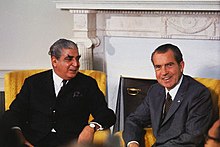Agha Muhammad Yahya Khan
Agha Muhammad Yahya Khan ( Urdu آغا محمد یحییٰ خان; * February 4, 1917 in Chakwal , near Peshawar , then British India ; † August 10, 1980 in Rawalpindi , Pakistan ) was a Pakistani general and president . He came from a family of Shiite Kisilbaschen of Persian descent, who trace their descent to Nadir Shah .
Life
Yahya Khan studied at the University of the Punjab and graduated from the Indian Military Academy in Dehradun , today's capital of the Indian state of Uttarakhand . During World War II he served as an officer in a Baluchi regiment in the Middle East and Italy, where he narrowly escaped captivity by the Germans.
After the founding of Pakistan in 1947, he organized the Pakistan Staff College. After the second Indian-Pakistani war he became the youngest at 34 years Pakistan brigadier general and at the age of 40 years, the youngest General . In 1951 he took over the 106th Infantry Brigade, which was on the armistice line of the first Indo-Pakistani war in Kashmir. After that - 1954–57 - Yahya Khan was Deputy Chief of Staff of the Planning Department of the Pakistani Army with the task of modernizing the armed forces . In the years 1958–1962 he was chief of the general staff and then - until the second Indo-Pakistani war - he commanded an infantry division. Immediately after this war he was promoted to lieutenant general and in March 1966 was appointed commander in chief of the army by President Ayub Khan .
President
On March 25, 1969, Yahya Khan succeeded the resigned Pakistani President General Ayub Khan , who was unable to cope with the country's political difficulties. He inherited a two-decade-old problem of ethnic rivalries between the Panjabers , Pashtuns and Muhajirs dominated Western Province and the ethnic Bengali Eastern Province. He also inherited the eleven-year-old problem of turning a one-man rule into a democratic regime.
Although the army chief had the potential and the qualifications for this, the simultaneous role as administrator of the country and draftsman of a provisional constitution, as well as the solution of the question of the unitary provinces and the satisfaction of the feeling of exploitation and discrimination of the East Pakistani Bengali overwhelmed him. Although he tackled the problems quickly, all measures came too late and only contributed to further alienation of the two parts of the country - West and East Pakistan .
Domestic political difficulties and the strengthening of the Awami League in East Pakistan under Sheikh Mujibur Rahman led to increasing radicalization and, as a result, to the third Indo-Pakistani War , in which the Pakistani armed forces in East Pakistan were crushed. As a result, East Pakistan declared its independence under the name of Bangladesh .
resignation
This led to the forced resignation of Yahya Khan from his office as president on December 20, 1971 and the assumption of the office by the then Pakistani Foreign Minister Zulfikar Ali Bhutto , who placed him under house arrest. Shortly thereafter, Yahya Khan was paralyzed by a stroke and subsequently played no further role in Pakistan's politics. He died on August 10, 1980 in Rawalpindi.
Web links
| predecessor | Office | successor |
|---|---|---|
| Muhammad Musa Khan | Commander in Chief of the Pakistan Army 1966–1971 |
Gul Hassan Khan |
| Muhammed Ayub Khan |
President of Pakistan 1969–1971 |
Zulfikar Ali Bhutto |
| personal data | |
|---|---|
| SURNAME | Yahya Khan, Agha Muhammad |
| BRIEF DESCRIPTION | Pakistani President and General |
| DATE OF BIRTH | February 4, 1917 |
| PLACE OF BIRTH | Chakwal , British India |
| DATE OF DEATH | August 10, 1980 |
| Place of death | Rawalpindi , Pakistan |
